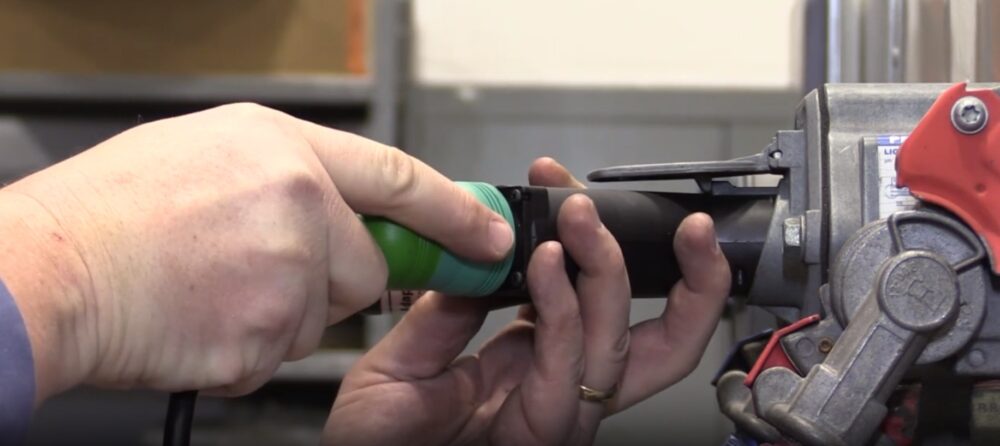Article courtesy of TIRE REVIEW.
By Tom Duke
Contributing Editor

Every tire dealer talks about customer service, but how well do dealers design customer service programs that build their business? When you review all of the things that contribute to the success of a dealership – products, marketing, price and more – customer service is the only one that begins and ends with and can be totally controlled by the owner/manager of the dealership and his team.
And unfortunately, well-meaning dealers can sometimes unknowingly allow poisonous customer service to enter their business and thrive in the actions of their employees. To eradicate this sometimes hidden killer, start by revisiting the customer service basics that follow and set up a plan to avoid the 10 most common examples of poisonous customer service.
Just What is ‘Customer Service’?
“Customers are our most important assets.” It’s an old adage, but it’s true. The most fundamental premise in business is that it exists to serve customers. To serve customers to the highest level, every tire dealer employee must understand the mission, goals and core values of the organization. These must be defined and in writing for everyone to share.
Most tire dealers know that it costs more money to gain one new customer than it does to retain 10 current customers. That 10-to-1 ratio is striking.
Everything a tire dealer’s employees do can either keep customers coming back or push them to go somewhere else to find the respect and treatment that will delight them. And that’s the proper word for the sensation of good customer service – DELIGHT.
Think about this: Unhappy customers are 11 times more likely to talk about their perceived poor experiences than happy customers are to talk about their positive experiences. So, the worse the customer service, the more likely it is to poison all you do, and despite all that you do well, fewer people will hear about it!
Many tire dealers have placed customer service at the top of their must-do list, even creating a customer service specialist or customer service manager position. They understand the need and value, even though the definition and application of “customer service” varies by dealer, by customer, even by the week.
The Basics
Customer service is not a thing, like a tire or a warranty or a spark plug. It is a culture, a concept that has to remain flexible and ever-changing in order to continue to delight customers.
The value each employee brings to the table must be centered on the fundamental premise of serving the customer, of delivering world-class customer service.
It is important that all employees in a dealership work as a team – from the sales staff on through the technicians who perform the mounting, balancing, alignments and repairs – to deliver this level of service, so they must understand and buy into the concept. Your business can gain a competitive edge when the entire team is focused on outstanding customer service, but that has to start at the beginning and be constantly reinforced and nurtured.
While problems with customer service can be fixed by using traditional methods – think training, motivation through rewards, learning what customers think and want, customer survey reviews – newer methods include placing the burden of “customer service” squarely on the shoulders of each employee.
While holding them accountable is one way to build the culture from top to bottom, if they are to have any “skin in the game,” they also should be your go-to for ideas on how to improve service. They are, after all, on the front lines each and every day, and if their focus is always on the customers, they should be the best resource for new ways to improve service.
Superior customer service also is created and maintained through building excellent relationships. Courtesy and friendliness are not enough anymore; buyers can get a warm smile and a “please and thank you” just about anywhere these days. To stand out from the crowd, you need strong relationships with your customers. People buy from people, and they especially buy from those with whom they have a relationship.
If you’re lucky enough to receive referrals because of word of mouth from satisfied customers, be sure to thank them for their referrals with a personal contact and a tangible reward such as a discount on their next tire purchase or service job.
Who Are Your Customers?
There are essentially five levels of customers who visit a tire store, according to Mark Hunter of “The Sales Hunter” (thesaleshunter.com). They include:
• Loyal Customers – They represent about 20% of your customer base, but make up no more than 50% of the sales.
• Discount Customers – They shop frequently but make their decisions based on the size of markdowns or the lowness of the price.
• Impulse Customers – They don’t have a particular item at the top of their buy list but visit the store on a whim. They will purchase what seems good at the time, particularly accessory items.
• Need-Based Customers – They need new tires or a particular service right now.
• Wandering Customers – They have no specific need in mind when they visit. They just want a sense of community. Not many of these customers come to a tire store.
All customers must be served, but the Loyal Customers and Impulse Customers should be at the top of the list, says Hunter.
With these customer types in mind, take at the following ways that some dealers poison their customer relationships.
10 Poisons to Avoid:
Many tire dealers commit one or more of the following customer service blunders – and some commit multiple errors. These poisonous practices are sure to lose customers for you, and include:
1) Hire employees hastily. Don’t do a reference check on a prospect to make sure they are the type of employee that has a positive attitude and can show that attitude to customers. You would be surprised at the number of owners who don’t do necessary complete background checks.
2) Keep your customers waiting. Stay on the phone for long periods. Ignore them by concentrating on personal interests. And make sure to interrupt your conversation with the customer by having other conversations with co-workers or other customers.
3) Use poor phone etiquette. Don’t pick up the phone by the second ring. When you do, just say “hello” or mumble something instead of “Good morning (or afternoon), Superior Service Tire, how may I help you?” Talk to someone else during the phone call.
4) Don’t have a return policy. Or one that is entirely flexible. Argue with a customer who wants to return a tire. Don’t give refunds. Ever.
5) Act as if your customers are necessary evils. Grudgingly greet them as they enter your store. Act as if they are bothering you and keeping you from other tasks or personal business.
6) Don’t provide customer service training for your employees who interact with customers. Let them mature by on-the-job training, even if they have no experience in selling to customers.
7) Put off correcting a mistake as long as possible. The longer you wait, the angrier a customer is likely to become. And the more likely they will just give up and go away. That’s your goal, right?
8) Don’t use existing technology to communicate. Further the attitude that social media – Facebook, Twitter, LinkedIn and others – are just a waste of time and not an important way to manage customer service.
9) Don’t work to correct situations that make your employees unhappy. This will have a ripple effect and impact the way customers are treated.
10) Sell tires on price only. Ignore the fact that customers are willing to pay more for good products when they are provided with first-class service.
Those 10 examples of poisonous customer service are, unfortunately, practiced by too many tire dealers as they “try” to sell tires and service.
The worst doses of business poison have to do with how you treat, train and encourage employees. Here are some examples of how your employees are involved in poor customer service:
• Employees not going out of their way to resolve a problem
• Not involving another member of the dealer staff to assist
• Not having the authority to fix a problem
• Not having a positive, helping attitude
• Dealer management not supporting/agreeing with the employee
Now, with all of that in mind, let’s look at what makes good customer service.
The Antidote
There is an “antidote” to the poison that can infiltrate a business. In logical order, these remedies should include:
• Establish a training program for your employees. The training should include segments on how to greet and work with customers who visit your store. Working with customers can be stressful and training can lessen this stress. You can develop your own program, but it would be best if you turn to a human relations expert to help you develop a professional program. Be sure that employees have all the necessary information about products sold and services offered at their fingertips. Customers want information now, not later.
• Have employees brainstorm their own ideas for delivering delight and develop an implementation plan. This offers employee ownership of the process and creates more involvement and passion for the job.
• Hire positive-thinking employees. Develop job descriptions for your employees that include a section about the ability to satisfy customer requests and demands. If you advertise for a new position – any position – include “delivering positive customer service” as one of the job responsibilities.
• Investigate any prospective employee’s job history to learn if they can work well with customers. Create a questionnaire for prospects that can give you some insight into how well they will work with customers. One of the key elements is to hire people with a positive outlook who will be happy in their job and will extend themselves to serve customers. A way to make employees happier is to give them the authority to meet customer needs and to settle customer complaints.
• When an employee has made a significant sale and acquired a new customer, take some time to celebrate.
• A critical matter is the handling of customer complaints. If a customer complains, the complaint must be taken care of immediately, not in days or weeks. Surveys show that customers are more loyal when you have solved their problem to their satisfaction than if they had never had a problem. And your customer complaint policy must allow for any possibility, so don’t ever say “no” or “never.”
• Make customer service the backbone of your business. The only reason you are in business is to serve your customers with quality products and excellent service. This should become as easy as breathing. Try to outperform the expectations of your customers. As the old saying goes, “Under promise and over deliver.” Your service doesn’t have to be elaborate, either. It can be as simple as following up on a promise, returning a phone call rapidly or thanking a customer with a personal card.
• As a small business owner, you can respond more rapidly and personally to your customers than larger businesses can. Remember, you should treat your customers as you would want to be treated.
• Develop a special telephone training program. This module should include a number of tips for great telephone customer service. As mentioned previously, don’t let the telephone ring more than twice before answering.
• Make a good first impression. You only have one chance to make a good first impression and it is vitally important that you do so. A customer who comes into your tire dealership should see an employee who is appropriately dressed and not one who looks like an unmade bed. Non-verbal communication can say a lot. Small things can also mean a lot, including your tone of voice, stance and your politeness quotient.
• Develop add-on programs for customers. Create a discount or premium program that will show appreciation and encourage customers to return – often. This will differentiate you from your competitors.
Non-Direct Communications
SCORE (score.org), a national organization affiliated with the Small Business Administration, provides resources and expertise to maximize the success of small businesses. It recommends several ways to provide great customer service over the phone.
Tips include: “Document everything that happens with a customer’s call, including time and date; a description of the question, problem or request; actions taken; and any follow-up contact. This information should be kept on file for regular customers.
“If you’re short of time and a call is not urgent, politely explain the situation to customers and get their contact information, including a convenient time when you can call back and discuss the issue at length. If you need to use an automated answering system, your customer service line should be one of the first options.”
Sharpen up your electronic technology techniques. It’s a given that virtually every business should have a website, and it should be well-designed with an attractive front page and be easy to navigate. Most importantly, the site should include information that will inform customers about your business, and a place for them to provide feedback about their experiences with your dealership.
A good website can build trust with your customers. But when you build your website, don’t forget to include your business address and phone number for each location. You might even decide to include your e-mail address as the owner/manager. That helps makes a nice, more personal connection.
Also, investigate establishing a Facebook page, then possibly a LinkedIn profile and a Twitter presence. Some customers like to communicate with social media and they can be useful for spreading the word about your company, products and service. Twitter can help you learn what others, including competitors, are saying about you.
Social media have protocols, too, and you must be active in posting messages as well as responding to them. Find an employee in your company who can head up this area. Don’t, however, let technology come between you and your customers.
Build a Healthy Culture
There are several broad areas you also should consider to improve your customer service and build a poison-free culture within your business.
Developing the personal skills of each employee who deals with customers is paramount. These personal skills include, among others, building a personal relationship, developing listening skills, and being aware of body language and eye contact. The customer’s name should be used to build a bridge. Finally, a customer should be asked, “Is there anything else I can do for you?”
To reinforce the customer service culture, employees responsible for working with customers should always answer their phone, keep their promises, look for a customer’s “touch” points and stay focused until a transaction is closed. Employees should have the authority to resolve issues that arise and all issues should be discussed in regular meetings.
And even when the transaction is complete, the job is not done. Follow-up is vital these days, so a personal phone call or card to check on the customer’s “delight quotient” should be automatic.
World-class customer service starts at the top, but it also starts at the beginning. How you approach hiring is crucial. You should first create a job description for every job. That enables you to set firmly in your mind the type of person you want. We mentioned previously that a test should be administered to determine a prospect’s ability to work with customers. This can be done in-house or by an outside firm.
Training is vital. Every employee should be directed to study the mission, goals and core values of your dealership, which should be in writing. Basic training should be given for all products and services offered. Tire and equipment manufacturers often offer this type of training. Above and beyond that, you should develop scenarios that illustrate customer-friendly approaches. Coaching and evaluations should be included in any training program.
Managers must serve as true leaders in this process. They must monitor each function, look for trends in the business, stay abreast of technology, stay current on what customers are thinking, share findings about customer attitudes with employees, look for “packages” that can improve value to customers and offer something extra to make your operation memorable.
Wrapping it all up, there are basic concepts tire dealers should consider implementing. They include:
• Offer something extra.
• Determine what makes your offer special.
• Constantly develop a list of customer service ideas, examine their feasibility, and implement the best.
• Keep your promises.
• Listen to your customers.
• Deal with complaints immediately.
• Be helpful and customer-focused, regardless of profit.
• Develop a staff that is helpful, courteous and knowledgeable – ALWAYS.
In short, the key to avoiding poisonous customer service begins and ends with your staff. In a world where tires are similar in most ways and most dealers sell multiple brands and offer similar services, there is one area that can make all of the difference in improved sales and profit.
And that is you and your team.


